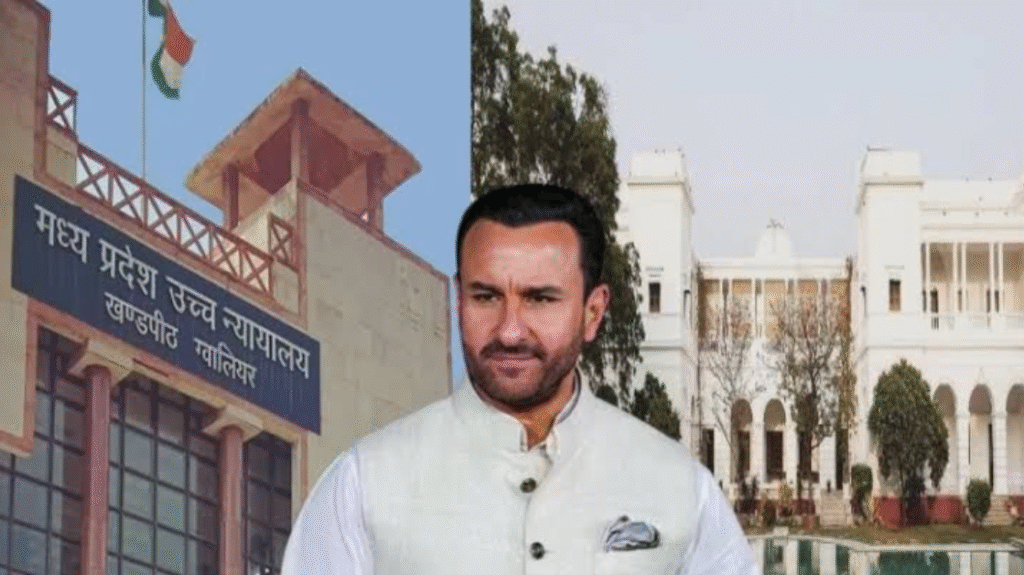In a major legal blow to Saif Ali Khan and his family, the Madhya Pradesh High Court has overturned a 2000 trial court ruling that had declared Saif, his sisters Soha and Saba Ali Khan, and their mother Sharmila Tagore as rightful heirs to parts of the Bhopal royal family’s ancestral estate. This fresh legal development significantly alters the inheritance landscape of the Bhopal royal legacy.
The case revolves around the legacy of Nawab Hamidullah Khan, the last ruling Nawab of Bhopal, and his daughter Sajida Sultan — who was Saif Ali Khan’s paternal grandmother. The trial court had earlier ruled in favour of the heirs of Sajida Sultan, granting them two personal properties in 2000. However, descendants of Nawab Hamidullah Khan and his elder brother challenged the decision, citing provisions of the Muslim Personal Law (Shariat) Act, 1937.

MP High Court Orders Retrial in Saif Ali Khan Bhopal Inheritance Case
The High Court has now directed the lower court to conduct a retrial and conclude proceedings within a year. The court found that the trial court had incorrectly assumed that the Nawab’s personal properties would automatically pass to the successor of the Bhopal throne. The petitioners argued that the trial court had not applied the personal law that governed inheritance at the time of the Nawab’s death in 1960.
This means that Saif Ali Khan’s claim to the property is not yet settled and will now be re-examined from scratch. The final judgment may completely change the structure of who inherits the massive Bhopal estate.
The “Enemy Property” Twist: ₹15,000 Crore in Question
This latest blow follows another major setback earlier this year, when the Madhya Pradesh High Court advised Saif Ali Khan to approach the appellate authority against a government order declaring some ancestral properties of the Pataudi family as “enemy property.” These properties, reportedly valued at around ₹15,000 crore, were seized under the Enemy Property Act, citing historical links with Pakistan.
If the retrial results in a ruling against the heirs of Sajida Sultan, it could mean that the Pataudi family’s ownership over prime real estate in Bhopal would be lost or heavily fragmented.
Legal and Social Implications of the Case
The Saif Ali Khan Bhopal inheritance case is more than a family property feud. It underscores how the legacy of princely states in India continues to create complex legal challenges. The application of Muslim Personal Law in determining inheritance rights and the interpretation of the Enemy Property Act are two key legal dimensions that are now under scrutiny.
Moreover, the court’s stand on throne vs personal property establishes a vital precedent for other royal inheritance cases across India.
Who Stands to Gain?
If the retrial favours the petitioners opposing Saif Ali Khan’s family, the estate may be divided among a wider group of heirs of Nawab Hamidullah Khan and his brother. This could dramatically shrink the share of the property that Saif and his family might inherit.
The case is also being watched closely due to the involvement of high-profile individuals from the entertainment industry, bringing public attention to legal issues surrounding royal titles, personal law, and disputed inheritance claims.
A Look Ahead
With the High Court setting aside the earlier verdict, all eyes are now on the fresh trial. The outcome will not only affect Saif Ali Khan’s claim to royal properties but may also create ripples across similar royal inheritance disputes still pending in Indian courts.
Whether the family will reclaim the estate or lose it permanently, one thing is certain: the legacy of Bhopal’s Nawabs is far from settled.
To read more Indian Laws and news, visit Legal Guide India



